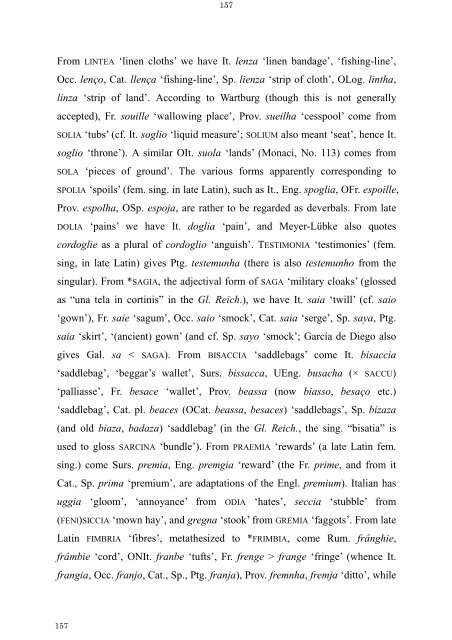The Latin Neuter Plurals in Romance - Page ON
The Latin Neuter Plurals in Romance - Page ON
The Latin Neuter Plurals in Romance - Page ON
You also want an ePaper? Increase the reach of your titles
YUMPU automatically turns print PDFs into web optimized ePapers that Google loves.
157<br />
157<br />
From LINTEA ‘l<strong>in</strong>en cloths’ we have It. lenza ‘l<strong>in</strong>en bandage’, ‘fish<strong>in</strong>g-l<strong>in</strong>e’,<br />
Occ. lenço, Cat. llença ‘fish<strong>in</strong>g-l<strong>in</strong>e’, Sp. lienza ‘strip of cloth’, OLog. l<strong>in</strong>tha,<br />
l<strong>in</strong>za ‘strip of land’. Accord<strong>in</strong>g to Wartburg (though this is not generally<br />
accepted), Fr. souille ‘wallow<strong>in</strong>g place’, Prov. sueilha ‘cesspool’ come from<br />
SOLIA ‘tubs’ (cf. It. soglio ‘liquid measure’; SOLIUM also meant ‘seat’, hence It.<br />
soglio ‘throne’). A similar OIt. suola ‘lands’ (Monaci, No. 113) comes from<br />
SOLA ‘pieces of ground’. <strong>The</strong> various forms apparently correspond<strong>in</strong>g to<br />
SPOLIA ‘spoils’ (fem. s<strong>in</strong>g. <strong>in</strong> late <strong>Lat<strong>in</strong></strong>), such as It., Eng. spoglia, OFr. espoille,<br />
Prov. espolha, OSp. espoja, are rather to be regarded as deverbals. From late<br />
DOLIA ‘pa<strong>in</strong>s’ we have It. doglia ‘pa<strong>in</strong>’, and Meyer-Lübke also quotes<br />
cordoglie as a plural of cordoglio ‘anguish’. TESTIM<strong>ON</strong>IA ‘testimonies’ (fem.<br />
s<strong>in</strong>g, <strong>in</strong> late <strong>Lat<strong>in</strong></strong>) gives Ptg. testemunha (there is also testemunho from the<br />
s<strong>in</strong>gular). From *SAGIA, the adjectival form of SAGA ‘military cloaks’ (glossed<br />
as “una tela <strong>in</strong> cort<strong>in</strong>is” <strong>in</strong> the Gl. Reich.), we have It. saia ‘twill’ (cf. saio<br />
‘gown’), Fr. saie ‘sagum’, Occ. saio ‘smock’, Cat. saia ‘serge’, Sp. saya, Ptg.<br />
saia ‘skirt’, ‘(ancient) gown’ (and cf. Sp. sayo ‘smock’; García de Diego also<br />
gives Gal. sa < SAGA). From BISACCIA ‘saddlebags’ come It. bisaccia<br />
‘saddlebag’, ‘beggar’s wallet’, Surs. bissacca, UEng. busacha (× SACCU)<br />
‘palliasse’, Fr. besace ‘wallet’, Prov. beassa (now biasso, besaço etc.)<br />
‘saddlebag’, Cat. pl. beaces (OCat. beassa, besaces) ‘saddlebags’, Sp. bizaza<br />
(and old biaza, badaza) ‘saddlebag’ (<strong>in</strong> the Gl. Reich., the s<strong>in</strong>g. “bisatia” is<br />
used to gloss SARCINA ‘bundle’). From PRAEMIA ‘rewards’ (a late <strong>Lat<strong>in</strong></strong> fem.<br />
s<strong>in</strong>g.) come Surs. premia, Eng. premgia ‘reward’ (the Fr. prime, and from it<br />
Cat., Sp. prima ‘premium’, are adaptations of the Engl. premium). Italian has<br />
uggia ‘gloom’, ‘annoyance’ from ODIA ‘hates’, seccia ‘stubble’ from<br />
(FENl)SICCIA ‘mown hay’, and gregna ‘stook’ from GREMIA ‘faggots’. From late<br />
<strong>Lat<strong>in</strong></strong> FIMBRIA ‘fibres’, metathesized to *FRIMBIA, come Rum. frânghie,<br />
frâmbie ‘cord’, <strong>ON</strong>It. franbe ‘tufts’, Fr. frenge > frange ‘fr<strong>in</strong>ge’ (whence It.<br />
frangia, Occ. franjo, Cat., Sp., Ptg. franja), Prov. fremnha, fremja ‘ditto’, while









